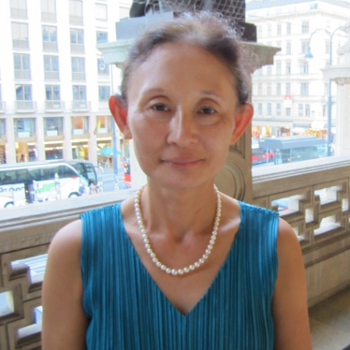There is no escape from the dysfunctional family’s tale of hatred and revenge in Philipp Stölzl and Philipp Krenn's new production of Elektra in Baden-Baden. The stark set of seven steep gray steps is confined to the front of stage, creating a sense of claustrophobic oppression. The director projects the German text on stage in various sizes. While these words initially seem distracting, it soon becomes an integral part of the music drama. The final phrase projected after everyone on stage is dead, “Diese Zeit, Sie dehnt sich ein finstrer Schlund” (This time, a dark abyss stretches out), a quotation of Chrysothemis’ earlier words, sums up the production team’s entire concept.
There are no stage props; occasional colour projections illuminate the changing moods of the protagonists. Costumes are in black and gray, the only colour being Elektra’s flaming-red hair representing her anger and passion. It is simple and straightforward, keeping the audience focused on the psychological dimensions of the opera.
The steep steps which also work as ceiling and floor, opening and closing, present a considerable physical challenge to the singers. Often they have to cower in narrow spaces, climb up and down – with an artificial leg and crutches in case of Oreste, who was clearly wounded in battle – and, for Klytaemnestra’s stunt double, roll down the steps upon her murder. There is no final awkward dance for Elektra as she is about to join the members of her family who are all dead on stage. It was unfortunate that her final utterance, “Everyone must dance!” was covered by the orchestra as Nina Stemme had to sing with her body bent forwards.
The brilliant ensemble of singers embraced the difficult staging to present one of the most heart-wrenching and arresting performances of the opera I have ever experienced. Stemme, approaching the twilight of her dramatic soprano days, is still a commanding and authoritative Elektra. Her high notes are no longer always reliable and sometimes have to be produced through sheer will and determination. They are, however, powerful and visceral, penetrating to the core of our psyche. Her voice seemed to acquire a whole new dimension upon her recognising her brother Oreste. She sang with extraordinary openness and tenderness, her voice carried aloft by the orchestra, soaring to a height of unimaginable beauty. There was not a dry eye in the theatre. Elektra is on stage for the entire 100 minutes, but Stemme showed no signs of fatigue, shading Elektra’s music with numerous colour palettes and dynamics. A performance to remember and cherish.
As Elektra’s more worldly sister Chrysothemis, Elza van den Heever sang with gleaming clarity if not always with warmth. Her high notes were secure and youthful, a perfect complement to Stemme’s strong and dynamic chest voice. Michaela Schuster, a veteran excelling in Strauss and Wagner roles, was an unusually sympathetic Klytaemnestra, singing with extraordinary mastery of the text. Her voice has warmth and colour and her clear diction made it possible to understand almost every word she was singing. Her scene with Elektra was directed as not a violent and hurtful confrontation but as a commune between two women in torment, two voices more often in harmony than conflict. Johan Reuter was a lighter-voiced but effective Orest, singing with urgency and intensity. As Aegisth, Wolfgang Ablinger-Sperrhacke was luxury casting and sang with his usual penetrating and humorous tone. Smaller roles were well cast, with the five maids in the opening scene making particularly strong impressions with their incisive singing.
One big reason to attend Baden-Baden's Easter Festival is to experience the world’s best orchestra, the Berliner Philharmoniker, in the pit for a fully-staged opera production. From the first dissonant Agamemnon motif, played with brilliant foreboding, their playing was nothing short of breathtaking musicianship, technical perfection and a single unified soundscape. Under the masterful and taught leadership of Kirill Petrenko, there was never a slack moment or misplaced note. Time flew by as the audience was bathed in this magnificent music drama, representing the work of two geniuses who lived over a hundred years ago, Richard Strauss and Hugo von Hofmannsthal, whose collaborative work continues to thrill and move as it is transformed into a production that lives and speaks to contemporary sensibilities.




